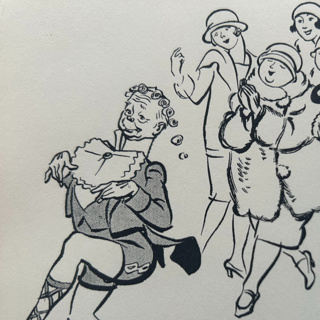
203. Carthaginian Peace
Before moving on from the times when Lloyd George held power, we take a look in this episode at one of the major moments of his time as an international statesman: the Paris Peace Conference and, above all, the specific agreement that emerged from it concerning Germany, the Treaty of Versailles. The episode draws heavily on the views of Maynard Keynes on the Treaty and its likely effects, in particular on its failure to react to the massive gap between the expectations of money from Germany by the victors and the real ability of Germany to pay. At the end, we look at the fact that as well as leaving a deep resentment in Germany of the victorious powers, it also left two nations that were actually with them, Japan and Italy, bitter with the outcome of the Paris conference. Germany, Italy and Japan. Compare that list with the membership of the Axis that the Allies would have to fight in World War 2 twenty years after the end of World War 1. An event which Keynes foresaw. Illustration: Covert og John Maynard Keynes’s book, The Economic Consequences of the Peace, of 1919. Music: Bach Partita #2c by J Bu licensed under an Attribution-NonCommercial-No Derivatives (aka Music Sharing) 3.0 International License
14 Juli 202414min

202. Fall following the decline
The Chanak crisis of 1922 brought Britain to the brink of war with Turkey. Saner heads, in particular those of both the British general on the spot and the Turkish leader, Mustafa Kemal, soon to be Turkish president as Kemal Atatürk, defused the crisis and averted war. But Lloyd George’s handling of the crisis, in which he took a distinctly hawkish stance, added further to the growing dissatisfaction with him as Prime Minister, and with his Coalition government, among rank and file Conservatives. That came to a head in the Carlton Club meeting in October, which voted for the Conservative Party to contest the forthcoming general election as a separate organisation and not merely a component of a Coalition. Both anti- and pro-Coalition ministers felt they had to resign from the government. The pro-Coalition Austen Chamberlain even gave up the leadership of the Conservative Party. Lloyd George, realising that his government was no longer viable, resigned. In the subsequent election, the Tories won themselves a strong working majority. The outcome for the Liberals was disastrous: they were overtaken by Labour which became the official opposition. Never since have the Liberals formed another government of their own, at best being a minor partner in someone else’s. Bonar Law, who had returned to the leadership of the Tories, became Prime Minister. That didn’t last long: cancer finished him within a few months, at which point he was succeeded by a Conservative who’d played a leading role in ending the Coalition, Stanley Baldwin. He and Ramsay MacDonald who had, in the meantime, again won the leadership of Labour, would dominate British politics into the mid 1930s in their rivalry and, sometimes, their collaboration. Illustration: Kemal Atatürk, who led the Turkish forces fighting for the independence of his country, inspecting troops in June 1922. Public Domain Music: Bach Partita #2c by J Bu licensed under an Attribution-NonCommercial-No Derivatives (aka Music Sharing) 3.0 International License
7 Juli 202414min

201. Decline before the fall
In 1921 and 1922, the sharks were beginning to circle around Lloyd George. While he thought that getting a Peace Treaty for Ireland was a major success, many felt dissatisfied with a compromise that gave no one entirely what they wanted, and therefore had a sense of being betrayed. That sense deepened as violence continued to surge in Ireland, even leading to the murder by anti-Treaty forces of one of the great figures of Sinn Fein, the pro-Treaty political and military leader, Michael Collins. He’d recorded in his diary, after accepting the Treaty in the negotiations with Britain, that he’d signed his death warrant. So it proved. The Irish violence even spilled over into a high-profile murder in Britain, for which the government’s Irish policies were blamed. On top of that came a scandal over the Lloyd George was shamelessly selling titles of nobility to get himself a political war chest. What he was doing wasn’t illegal at the time, and since he had no party behind him to raise money or run campaigns, he chose this short cut to financing his political work. That, however, did him no favour among Conservatives becoming increasingly disenchanted with him and wondering why, with a majority of their own in the House of Commons, they still had to rally behind a Liberal as Prime Minister. Wasn’t it time to break with him and with his coalition and prepare to form a government of their own again? Top Tories holding positions in his government remained true to the coalition and to him. But their rank and file was running out of patience. And that spelled nothing good for Lloyd George. Illustration: Michael Collins addressing a crowd on St Patrick’s Day, 1922, less than half a year before his death. Public domain photo Music: Bach Partita #2c by J Bu licensed under an Attribution-NonCommercial-No Derivatives (aka Music Sharing) 3.0 International License.
30 Juni 202414min

200. Ireland partitioned
Would Britain go to war in Ireland? Was military action its only available response to the republican party, Sinn Fein, and its determination to govern an independent nation from its own parliament, the Dáil? And, indeed, was it in Britain’s power to go for that option? At first, that certainly seemed to be the way things were heading. Attacks by IRA units against the police or army led to increasingly brutal reprisals by the British authorities, using the notorious Black and Tans or the Auxies, as well as soldiers. Two of the most shocking events were the firing on the crowd at a Gaelic Football stadium on ‘Bloody Sunday’, 21 November 1920, and the burning of Cork the following month. In the end though, the Lloyd Government had to decide that it lacked either the strength or the stomach to force the Irish to bow to their rule. The earlier decision never to negotiate with terrorists had to be dropped and, in the summer and autumn of 1921, discussions finally led to what Lloyd George believed was a triumph of his negotiating skills. He won the agreement of leading Sinn Fein men to a Peace Treaty that partitioned Ireland, hiving off the six Protestant-majority counties of the North which would remain inside the United Kingdom, while the other 26 would form a new Dominion, the Irish Free State, within the British Empire. It seemed like a triumph for him. But that feeling wasn’t going to last long. Illustration: Workers clearing rubble on St Patrick's Street in Cork after the fires (detail). National Library of Ireland on The Commons @Flickr Commons Music: Bach Partita #2c by J Bu licensed under an Attribution-NonCommercial-No Derivatives (aka Music Sharing) 3.0 International License.
23 Juni 202414min

199. Unaffordable, looming wars
We saw last week that Britain wasn’t in any fit state to go fighting more wars in 1919. Having got out of the bloodiest war in history (up to then), a deep war-weariness had set in amongst the combatants, and no one felt up to more fighting. The British economy too was in no state to stand another war, what with Britain heavily in debt, to the point where its status as the banker to the world was now swiftly going down the pan. Indeed, the country taking over that role, the United States, was the very country to which a quarter of Britain’s war debt was due. Everything was made much worse by the fact that war seemed to be brewing in every direction. The very collapse of the Empires defeated in the Great War – the Russian, the Austro-Hungarian and the Ottoman – had produced a different and highly unstable constellation of potentially conflicting nations. For Britain, one of the areas where war most threatened, was on its very doorstep – in Ireland. A subject we’ll pick up next week. Illustration: Woodrow Wilson, US President who dreamed up the League of Nations but couldn't get his own nation to join. Public domain. Music: Bach Partita #2c by J Bu licensed under an Attribution-NonCommercial-No Derivatives (aka Music Sharing) 3.0 International License.
16 Juni 202414min

198. Unfit for heroes
At the end of the First World War, a devastating worldwide flu pandemic killed perhaps as many as 50-100 million around the globe, and even 228,000 in Britain. That was a cruel addition to the 880,000 lost to the war itself. Despite that blow, Lloyd George’s government did what it could to realise its objective of making Britain a ‘land fit for heroes’. That meant moving on with the programme of social reforms he’d already launched before the war. He made considerable progress in health, education, pensions and housing. However, Lloyd George was a Liberal Prime Minister in a Tory-dominated government. That imposed serious limitations on how far he could take a radical programme. This was made worse by the economic downturn that hit the world economy in 1920. The Conservatives, never very keen on all this social radicalism, became increasingly concerned about Lloyd George when economic conditions it more difficult than ever to finance the kind of public spending that his reforms required. The Prime Minister, coming under growing pressure from his Conservative partners, tried to placate them by dumping a Minister most associated with this high spending, even though he was an important ally to him. Christopher Addison, perhaps the most distinguished medic ever to become a Member of the British Parliament, was driven from his position and soon afterwards resigned. Something similar happened with Edwin Montagu who, as Secretary of State for India, had begun to introduce a programme of political reform there. Confused and far too limited, it was still a well-intentioned initiative, hated by the arch-imperialists, such as the Conservative MPs who had backed General Dyer, the man responsible for the Amritsar massacre. Eventually, Montagu too had to go. The trouble was that throwing raw allies to the Tory so-called diehards in this way didn’t blunt their growing opposition to him. It did, however, deprive him of much-needed support. Illustration: Christopher Addison in 18917, by Walter Stoneman, National Portrait Gallery x67932 (left), and Edwin Montagu, public domain. Music: Bach Partita #2c by J Bu licensed under an Attribution-NonCommercial-No Derivatives (aka Music Sharing) 3.0 International License.
9 Juni 202414min

197. White Man's Burden
Rudyard Kipling’s poem, The White Man’s Burden, is a song of praise to the selflessness of the white man who goes out to the lands of benighted savages and gives them the benefits of his wisdom and kind, if stern, governance to protect them from their own savagery. Sadly, when we take a closer look at imperialism, we find a rather different picture. That’s anyone’s imperialism and not just the British version. This episode looks at the impact of the Spanish and Portuguese in what would become Latin America, as well as the US in the Philippines (powerfully denounced by Mark Twain). But it concludes in India, and the incident that became the turning point for Indian political leaders, previously loyal to the Empire, but convinced by that innocent that British rule had to be ended. One of the key aspects of that incident, an obscene massacre followed by further severe oppression, was that the perpetrator faced little sanction in Britain, while the victims in India received little help. It’s no surprise that the stark contrast caused faith in British fair play to crumble. The growing resistance to British power wasn’t the reaction the perpetrators had hoped for, but it’s the reaction they should have expected. Illustration: Jawaharlal Nehru and Mohandas Ghandi. Public domain. Music: Bach Partita #2c by J Bu licensed under an Attribution-NonCommercial-No Derivatives (aka Music Sharing) 3.0 International License.
2 Juni 202414min

196. An independent Ireland?
The 1918 election was a disaster for the Liberal Party. Although Lloyd George’s faction, inside the coalition government with the Conservatives, took 127 seats, the Liberals independent of the coalition only won 36. Asquith himself, their leader, even lost his seat. The Conservatives saw a huge surge in their number of MPs and could have formed a government themselves. For the time being, though, they stuck with Lloyd George, seen by many as ‘the man who won the war’. The biggest defeat was for the traditional nationalist MPs from Ireland, thrashed by Sinn Fein, backers of an independent Irish Republic. The Nationalists were reduced to 7 seats while Sinn Fein won 73. One of these was taken by the first woman to win a seat in the British parliament, the Easter Uprising veteran Constance Markievicz. However, neither she or any of the 72 other Sinn Fein MPs took their seats, instead calling a meeting of the first ever Dáil Eireann in Dublin, the first Irish parliament. Over the next year and a half or so, there would be some violent incidents in a growing Irish War of Independence. The most threatening development for the British Empire, though, was how Sinn Fein began to build an independent government, increasingly winning allegiance from the population in the south and west. The British sent increased forces, many of them ex-soldiers, but fighting only really took off from the summer of 1920. A matter we’ll return to in a later episode. Illustration: Countess Markiewicz, Easter Uprising veteran, first woman elected to the British Parliament, one of the first women to become a cabinet minister in Europe. Music: Bach Partita #2c by J Bu licensed under an Attribution-NonCommercial-No Derivatives (aka Music Sharing) 3.0 International License.
26 Maj 202414min





















